Ronald Clifford Thomas Goodwin was born in Kidderminster, Worcestershire on the 26th April 1918, son of Stanley Goodwin and Eileen M. Goodwin (née Nichols). His father own a garage business in Kidderminster. The family lived at Comberton Hall, Kidderminster.
Ron was educated at Rossall School, Fleetwood, Lancashire, where he was Cadet Sergeant in the schools O.T.C.
Ronald Goodwin was commissioned into the
Worcestershire Regiment on the 26th July 1939 and joined the 7th Battalion Worcestershire
Regiment. After training with the battalion at Marlborough he sailed with
them to France on the ss. Amsterdam troopship on the 14th January 1940, as
part of the British Expeditionary Force.
He started a diary on the 1st January 1940, recording the day to day
activity, which he continued to make entries while in France and Belgium in
1940. However, during the British retreat to Dunkirk his diary was lost
during the fighting near the canal at La Bassée on the 26th May 1940.
During the German advance and the fighting near the canal a soldier, Horst
Kallmeyer, of the 7th Company of the SS Germania Regiment of the SS-VT
(Verfügungstruppe) Division found the diary and started to use it himself
to keep a record of his experience during the war.
For over 65 years nothing was know of the diary until the wife of Horst
Kallmeyer died and the grandson found the diary and other papers and photos
of his grandfather whilst clearing out his grandparents home. The grandson,
who is a Captain with the Hamburg Police, decided to try and find out
something about the original owner of the diary, Ronald Goodwin, and
contacted this website. As a result we have been able to put together the
story of the diary and what happened during the British withdrawal to Dunkirk,
with details from both sides.
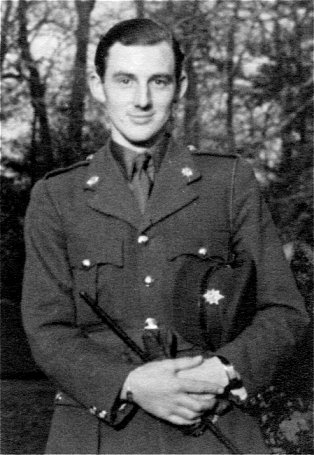
Lieut. R. C. T. Goodwin (1939)
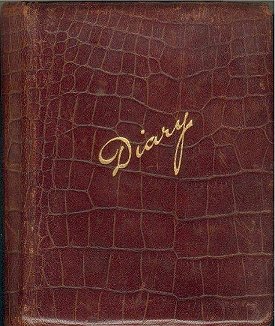
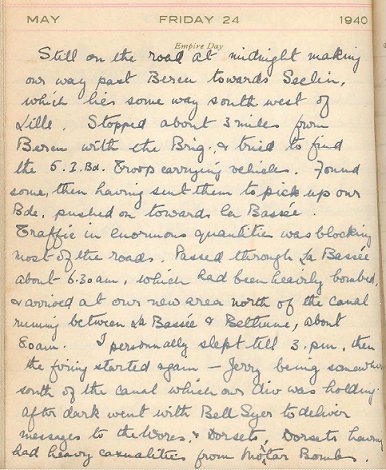
Diary of Lieutenant R. C. T. Goodwin
Extract from the diary for Friday 24th May 1940
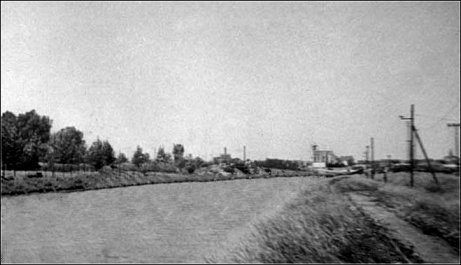
View of the canal at Le Bassée (May 1940)
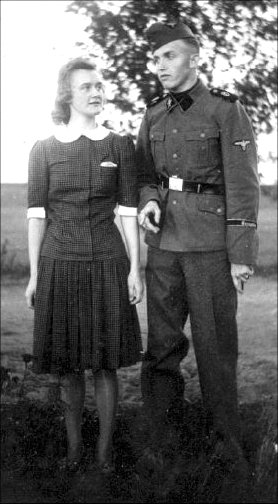
Horst
Kallmeyer as a Private Soldier
with his future wife (early 1940)
On Friday 24th May 1940 - Horst
Kallmeyer wrote (details of the German situation):
"The first attack approaches. We leave our position and line up for the attack. Our company goes forward along the street Lillers Saint
Venant. The Tommies
retreated from their positions at the first canal, after they had bombed the bridges.
They also had to leave behind some of their dead comrades. Our group is the
lead company and advances forward making our way across the damaged bridge
across the canal, which in places was below the water line. Group leader (Hauser) is
also with us. On the other side
we advance forward. We receive gun fire. The groups go behind houses to take
cover I am selected as a battlefield observer and get the field glasses of
U.-Schafü. Lengemann. In a fork in the road I lie down in a ditch and observe. We wait for
other companies and Anti-Tank guns to move up to the canal. On the street
about 800-1000 metres on the left enemy motorized columns withdraw. From the
first houses in Saint Venant in front of our position we received some gun
fire. Rottf. Hermes and Petrie (marksman with sight telescope) fire back. Finally,
as we advance further, the gun fire continues, some wounded of our Anti-Tank
are brought back by motorbike. When we finally enter the first houses in Saint Venant
we find that the Tommies have gone but left their baggage and ammunition behind. "
"I stayed with the company commander. With 4-5 men we have taken over the
lead. The company did not follow fast enough. We advanced on the left along Saint
Venant. A slightly wounded Tommy
stands up in his trench with his arms in the air. The horror and the fear are reflected in his face. Unfortunately, G. and D.
over reacted and hit the Tommy in the face with a grenade . Then the Englishman
was collected by the orderly and is taken back behind our lines."
"We advanced further along the canal behind Saint
V. I could hardly run, because of blisters on my feet, and, therefore, I
used a bicycle from a farmhouse."
"Our company was directed to the right. We move forward to the front line near a partially destroyed bridge. A sad sight. 6 dead companions lie before the bridge with full equipment. The whole group of the M.G. troop and 2 rifle men were killed."
"2-3 Kms before the bridge we dug-in in a wheat field. (Armoured holes in the budget) I had to go back with 2 companions to the castle to get some food from the field kitchen. We went there on bicycles. In the field kitchen and in the castle there was champagne and wine (a whole cellar full). We search the castle, took some food and champagne and return back to our lines. Warm food was greeted with pleasure. As darkness fell outposts were positioned in front of our lines. I went forward at 11.00 o'clock with Meinecke, Ahrend and Schwabenstöcker, after 15 minutes we were told to return. The Tommies were about to attack, we had to go back, because our lines were too thin, we could be cut off too easily."
La Bassée canal
Battalion held line of canal. Enemy activity increased - heavy shelling and Mortar Fire intermittently all day. Many casualties, including 2/Lieut. D. G. Goodwin, killed while trying to make contact with the Company on his right. Lieut. J. F. Betts wounded.
Battalion badly situated, having practically no field of fire, and no observation. All our posts could be observed from enemy vantage points on Southern side of canal, and by enemy reconnaissance plane flying over our positions during all hours of daylight. During the late afternoon or evening some enemy must have crossed the canal in the centre of our front. On recce, and while trying to locate "A" Company's position , Commanding Officer, 2 i/c. I.O., and 2/Lieut. R.C.T. Goodwin came upon an enemy post, which opened fire and wounded 2 i/c. (Major R. M. J. Goldie), and I.O. (2/Lieut. R.R. Woodward). During the night one Company 1st Camerons, made a counter attack on our left, but failed to make contact with the enemy, who were reported to have crossed canal.
CLICK HERE TO VIEW A PHOTO GALLERY ABOUT LIEUT. R. C. T. GOODWIN
CLICK HERE TO READ A FULL TRANSCRIPT OF LIEUT. R. C. T. GOODWIN'S DIARY
CLICK HERE TO READ A FULL TRANSCRIPT OF HORST KALLMEYER DIARY